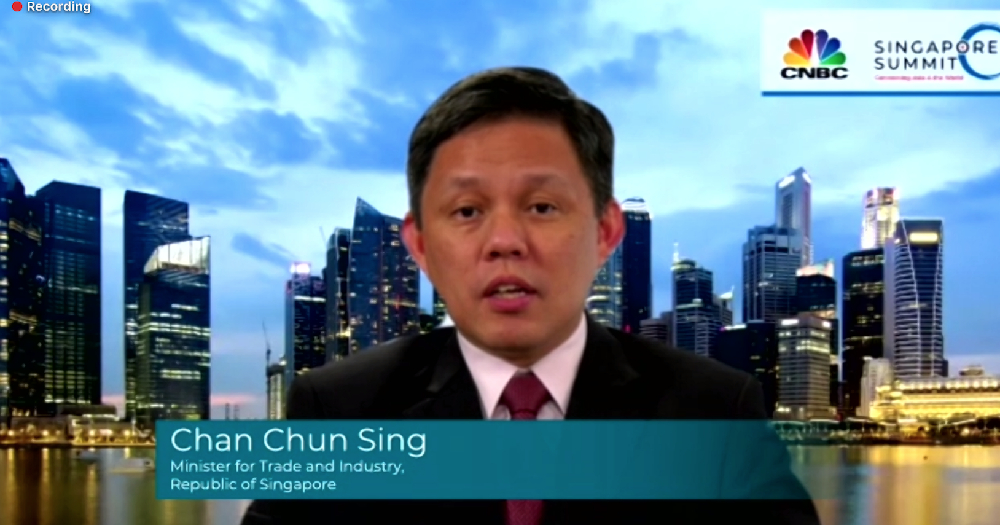Singapore does not believe it will run out of jobs as it has 3.5 million jobs for 2.5 million Singaporeans, Trade and Industry Minister Chan Chun Sing said on Thursday, Sep. 18.
White-collar jobs at risk too with widespread digitalisation
Speaking at a panel on digital connectivity at the Singapore Summit -- a forum that brings together thought leaders to discuss global trends -- the minister brought up the point while talking about how digitalisation is affecting the world's distribution of jobs.
The forum, supported by the Singapore Economic Development Board, the Monetary Authority of Singapore, sovereign wealth fund GIC and state investor Temasek, is held virtually this year from Sep. 14 to 17 in light of the ongoing pandemic.
Chan explained that there has been a paradigm shift in that people in the past thought blue-collar workers' jobs were at risk as they can be replaced by robots and automation, but that has changed recently as the world is increasingly realising that "competition is getting tougher for white-collar jobs that can be done over the internet".
The Covid-19 pandemic has further emphasised these changes, as more people started working from home.
Chan said people would begin to ask what the difference is between working from home in one place, and working from home in another country.
They might then think that jobs that can be done over the internet can be done anywhere in the world too.
This means white-collar jobs would no longer have the "geographical insulation" that they used to have, as these jobs become much more competitive and connected playing field across the entire world, Chan said.
 Image via Singapore Summit/Facebook
Image via Singapore Summit/Facebook
White-collar workers need lifelong learning
And this is why even white-collar workers would require lifelong learning in order for them to stay competitive, he added, before saying that Singaporeans do not have to worry about not having a job as there are 3.5 million jobs available for 2.5 million locals.
While Chan said more automation and digital trade will be good for Singapore, the country faces the challenge of equipping locals sufficiently so they are able to adapt to the changing job landscape.
These locals might have been displaced by digitisation and automation, and by equipping them with new skills, they could move on to the new economy.
Chan said the government's goal is to keep workers at "the forefront of technology to seize new opportunities, looking for tomorrow's jobs rather than just hoping that yesterday's jobs will come back once again".
Singapore to help companies penetrate global markets
In response to a question from the audience on the industries that Singapore is focused on helping to pivot to new markets in the post-Covid world, Chan said the country is going to step up its efforts to help so-called "Group A companies" grow and penetrate the global markets.
These companies are in the ICT (information and communications technology) professional services, financial services, biomedical industry, as well as precision engineering industry, he elaborated.
He added that the government will also help those in the aviation and tourism sectors, which have been badly hit by the pandemic, to pivot to new markets and industries.
Singapore can benefit should it position itself well
Chan later said that as people become more concerned with resilience instead of efficiency, there will be "a reshuffling of global supply chains and global value chains", which will be good for Singapore should it position itself well as there will be more opportunities for the country.
While Singapore might not be considered as part of the global supply or value chain in the past as it was not seen as "the lowest cost country", the pandemic might have changed the perception towards it.
Chan said:
"Through the pandemic, I think people have seen the reliability of the Singapore system, and because of that, more investments are attracted to base out of Singapore to continue to serve the global markets, even in the midst of a pandemic and other crisis that may happen in the future."
He continued to explain that Singapore's policy is to make sure that it maintains "an open posture" to trade, so that people can have confidence to base their operations out of Singapore regardless of the situation, be it in peacetime or in crisis.
Singapore Summit 2020:
Totally unrelated but follow and listen to our podcast here
Top image via Singapore Summit, Plenary Session 4
If you like what you read, follow us on Facebook, Instagram, Twitter and Telegram to get the latest updates.
